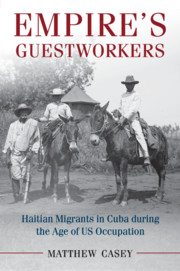Book contents
- Frontmatter
- Contents
- List of Figures, Maps, and Tables
- Acknowledgments
- Introduction
- Prologue: Experiencing the Unevenness of Empire
- 1 Making the Haitian Cuban Border and Creating Temporary Migrants
- 2 Leaving US-Occupied Haiti
- 3 Living and Working on Cuban Sugar Plantations
- 4 Picking Coffee and Building Families in Eastern Cuba
- 5 Creating Religious Communities, Serving Spirits, and Decrying Sorcery
- 6 Mobilizing Politically and Debating Race and Empire in Cuban Cities
- 7 Returning to Haiti and the Aftermath of US Occupation
- Epilogue: Enduring Legacies and Post-Colonial Divergences
- Bibliography
- Index
Epilogue: Enduring Legacies and Post-Colonial Divergences
Published online by Cambridge University Press: 27 April 2017
- Frontmatter
- Contents
- List of Figures, Maps, and Tables
- Acknowledgments
- Introduction
- Prologue: Experiencing the Unevenness of Empire
- 1 Making the Haitian Cuban Border and Creating Temporary Migrants
- 2 Leaving US-Occupied Haiti
- 3 Living and Working on Cuban Sugar Plantations
- 4 Picking Coffee and Building Families in Eastern Cuba
- 5 Creating Religious Communities, Serving Spirits, and Decrying Sorcery
- 6 Mobilizing Politically and Debating Race and Empire in Cuban Cities
- 7 Returning to Haiti and the Aftermath of US Occupation
- Epilogue: Enduring Legacies and Post-Colonial Divergences
- Bibliography
- Index
Summary
In January 1939, a group of Haitians was deported from Santiago de Cuba to Port-au-Prince, marking the symbolic end of the seasonal migratory movement. In May of the following year, a Haitian sloop was stopped as it arrived at the Punto de Maisí, the easternmost tip of Cuba. The boat was carrying thirty-nine immigrants who had paid a ship captain in Port-au-Prince to smuggle them into Cuba; none had documents. Cuban authorities jailed the ship captain and the migrants were likely returned to Haiti.
On the one hand, these people fall outside standard periodizations of Haitian migration to Cuba, including the one established in this book, that treat the 1930s as the decade when labor migration ended and forced repatriations sent many in the opposite direction. On the other hand, their lives have everything to do with the spirit of this project, which has used migrants’ experiences to cut through received wisdom and challenge assumptions about Haiti and Cuba. If I have done my job, then it should not be so surprising that these individuals arrived nine years after the Cuban government had outlawed Haitian immigration, six years after US troops left Haiti, and months after the start of the Cuban sugar harvest.
This epilogue will briefly discuss the connections between Haiti and Cuba since 1940, which were influenced by the earlier period of migration. Even after Haitian agricultural workers largely stopped coming to Cuba, prominent Haitians continued to establish political and cultural links with the neighboring island. In the late 1950s, new regimes in both countries placed Cuba and Haiti on opposite ends of the political spectrum, cooling official relations for decades. Nevertheless, stereotypes about Haitians persisted in Cuba after migration itself had ceased to be a political issue. These remained even after Cuba's revolutionary government enacted policies to promote economic equality in the 1960s and champion Haitian folklore in the 1970s. The 1990s brought new opportunities and setbacks to Haitians and their descendants in Cuba. That decade witnessed the fall of the Soviet Union and the beginning of the “Special Period.” The Cuban government was forced to promote foreign tourism and outside investment to combat the ensuing economic depression.
- Type
- Chapter
- Information
- Empire's GuestworkersHaitian Migrants in Cuba during the Age of US Occupation, pp. 267 - 282Publisher: Cambridge University PressPrint publication year: 2017

